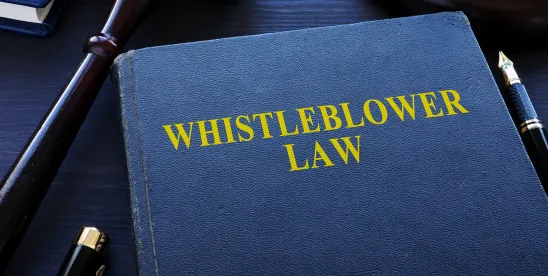People with insider access to a transaction or ongoing agreement between the federal government and a government contractor often find indications of fraudulent activity or other misconduct. If they decide to act on that information, these people generally have two pressing concerns:
- Making the information public, and
- Keeping their job.
Federal whistleblowing law provides several important avenues for disclosing this sensitive information and gives whistleblowers legal protections from workplace retaliation.
- How Whistleblower Cases Bring Incriminating Information to the Public
Broadly speaking, whistleblower cases involving government contractors follow the same basic steps:
- You first find evidence of misconduct or illegality, often at work, and investigate
- Further investigation confirms your initial suspicions, and you delve further
- You find and hire a whistleblower lawyer for government contractors
- With the lawyer’s legal advice, you gather evidence and build a case
- You present your case to the appropriate audience, often (though not necessarily always) a federal law enforcement agency, federal employee responsible for contract or grant oversight, government accountability office, management official, or other law enforcement agency.
Which agency you pitch your claim to will depend on the nature of the allegations you are making and on which whistleblower law you are invoking.
At that point, the authorized official can either intervene in your case by taking over the investigation or decline to intervene.
If they intervene, most of the work will be taken over by the agency’s investigators, and you and your legal team can take a back seat in the process. While you lose control of how the case progresses on judicial or administrative proceeding, you also benefit from the massive amounts of resources that the investigative team from a large federal agency responsible can put on your case.
While every case is unique, federal law enforcement agencies tend to intervene more often in cases that violate a law rule, or regulation related to:
- Involve significant amounts of federal funds against the government
- Put people in substantial and specific danger from the misconduct
- Involve sensitive areas of national security or other issues that could create a scandal
- Are allegations of misconduct or abuse of authority relating to a federal contract or personal services contract strongly supported with factual evidence
However, if the agency declines to intervene in your case, it means your case is over. You can still press forward with a whistleblower claim by filing a lawsuit in a grand jury – you would just have to do it without the assistance of the federal agents and investigators. This is why it is generally a good idea to hire a large law firm to pursue a whistleblower case and address misconduct, particularly against a major federal contractor: Smaller firms rarely have the resources or the personnel necessary to conduct the thorough investigation that is often necessary to assemble a strong case.
Importantly, federal law aims to incentivize blowing the whistle on misconduct committed by government contractors by giving whistleblowers a share of the defrauded funds. If your claim is based on the False Claims Act, you could recover anywhere from around 10 to 30 percent of the settlement or verdict. Given that the damages recoverable in cases under the False Claims Act are triple the amount that was fraudulently obtained, that whistleblower award can be significant.
- How Federal Law Protects Whistleblowers from Retaliation
Whistleblowers who take these actions to reveal what they have found are often worried that they will suffer professional consequences for their actions. However, several federal laws forbid workplace retaliation against whistleblowers. While it is true that many employers – particularly government contractors who are actively defrauding the government – may retaliate against you, those laws give you legal recourse for this sort of unlawful conduct.
The two most important anti-retaliation laws for blowing the whistle on government contractor fraud are the:
- Whistleblower Protection Act of 1989
- False Claims Act
While the Whistleblower Protection Act itself only applies to federal employees, it was drastically expanded by the National Defense Authorization Act. That expansion covers private sector employees who work for government contractors and even the employees of government subcontractors.
Covered workers are protected from “personnel actions” by these laws, which include:
- Termination
- Suspension
- Reassignment
- Refusal to promote
- Demotion
- Any reduction in workplace conditions, responsibilities, pay, or other benefits
Any of these personnel actions are unlawful if they are causally connected to you blowing the whistle on a wide variety of misconduct – not just defrauding the government – such as:
- Abuse of authority
- Substantial and specific threats to the public health or safety
- Gross mismanagement or financial waste
- Violations of state or federal law, rules, or regulations
If you blow the whistle on any of these forms of misconduct, and then your employer retaliates against you with one of the listed personnel actions, you can file a lawsuit against them for wrongful termination or another form of workplace retaliation.
In addition to the Whistleblower Protection Act, the False Claims Act has its own anti-retaliation provision, 31 U.S.C. § 3730(h). Under this provision, you are entitled to relief if you suffer any of the following in the workplace because of your whistleblowing activities:
- Discharge
- Demotion
- Suspension
- Threats
- Harassment
- Any other type of discrimination based on the terms and conditions of your employment
If your employer does any of these things, you are entitled to:
- Reinstatement, if you were demoted or terminated
- Back pay, plus a financial penalty equal to the amount of that back pay
- Interest on the back pay
- Court costs
- Attorneys’ fees
As with the Whistleblower Protection Act, you can recover this relief through a wrongful termination or other workplace retaliation lawsuit.



 />i
/>i
